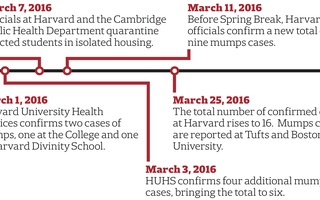Health experts discussed difficulties in identifying the Zika virus and emphasized international collaboration to combat its outbreak in front of a large crowd at the John F. Kennedy Jr. Forum Wednesday.
The Zika virus, whose first confirmed human case of infection was in 1952, according to the World Health Organization, has recently returned to the public spotlight following a rise in recent outbreaks. Since 2007, the virus has cropped up at increasing rates in new regions such as the Pacific and South America. The virus is transmitted by day-biting mosquitoes as well as through sexual transmission.
Moderated by Harvard Kennedy School lecturer Sheila Burke, the panel explored ways to contain and prevent the spread of the virus.
Speakers referenced the haphazard international response to the 2014 Ebola outbreak as a cautionary tale for future global health epidemics.
“Following the outbreak of Ebola and the widely held view that we were ill-prepared, an effort was made to develop a framework for the management of such crises. Today, the [World Health Organization] published a six month plan to coordinate a multinational response to the spread of Zika, illustrating lessons that were learned from Ebola,” Burke said.
Michael J. VanRooyen, head of the emergency medicine department at Brigham and Women’s Hospital and director of the Harvard Humanitarian Initiative, added the United States healthcare system is not yet prepared to contain Zika in a timely manner.
VanRooyen’s recent experience attempting to obtain a Zika test illustrated the lack of an infrastructure for Zika virus prevention.
“Today I was working over at the Brigham ER, so I decided to get a Zika test to figure out if I could get tested. I was informed that I first had to make an appointment with the [Obstetrics] department first, as they are the ones who actually have to order it. Then I had to sit down with a counsel to discuss it, as well as send a urine sample to a reference lab to get tested, which would take about three and a half weeks to get back to me,” VanRooyen said.
“So by the time I got the appointment, I got the test, it was going to be about a month and a half before I would find out,” VanRooyen added.
VanRooyen was joined at the event by Helen Branswell, a senior global health writer for STAT, and Howard A. Zucker, New York State’s health commissioner and a former Assistant Director-General of the WHO.
The panelists agreed that increased intergovernmental collaboration provides the best solution to containing the virus.
“Global problems require global solutions,” Zucker said.Read more in University News
Recent Graduate Sues Harvard Over Sexual Harassment CaseRecommended Articles
-
A Real Halloween MonsterEbola Hemorrhagic Fever. One of the most terrifying infectious diseases known to man has once again mysteriously surfaced, this time
-
Yet Another Ebola LessonOnce again, the virus that conjures special images of fear among scientists and the general public has surfaced. And, once
-
Results in Leiter Cup GamesIn the Leiter Cup series yesterday the Craigies defeated the Harvard Square A. A. by the score of 7 to
-
New Humanitarian Studies Course DebutsThe course, entitled GHHP 70: “Global Response to Disasters and Refugee Crises,” is intended to teach students to apply global health theory and policy to real-world humanitarian crises.
-
 As Commencement and Summer Travel Approach, Mumps Cases Hit 58
As Commencement and Summer Travel Approach, Mumps Cases Hit 58













